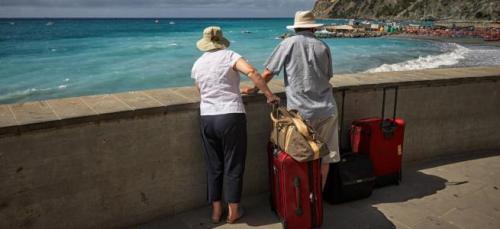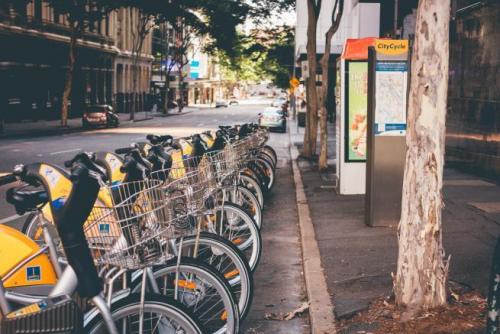The Journey Away From A Use-and-Throw-Away Holiday

Let’s start with a trip to Berlin. When you go on a weekend getaway to Berlin or some other destination, on paper it is more sustainable to stay in a flat you have rented through the sharing-economy service Airbnb than in a hotel. The total CO2 emission of a night in an Airbnb property is assumed to be smaller.
But that is a paradox, explains tt备用网址 (with special responsibilities) Flemming S?rensen who is researching circular economics in tourism.
?The paradox is that the options provided by Airbnb actually mean that people travel more and go on more, short weekend getaways. The people renting out properties are also more likely to travel. So, while on paper it is a more sustainable form of accommodation, the trend also causes problems, because in principle it leads to more air traffic and thus more pollution,? explains Flemming S?rensen.
It may well be that on a daily basis we are conscious of sorting waste and turning off the water when brushing our teeth. But when on holiday, we tend to adopt irresponsible practices and put our conscience on hold
Circular economy in brief
A circular economy is an economic system, in which, for the sake of the world’s resources, one seeks to recycle resources and completely abstain from producing waste. The circular economy is opposite to traditional economy, where you start by extracting some resources which then end up as waste. Circular economy in tourism can be about everything from more efficient sorting of waste and taking trains instead of planes to a destination to using a bike instead of a car, once you are there.
What has the most impact - smarter cruises or more bike tourists?
There are many paradoxes when you look at tourism through circular economic glasses For example, does making the cruise industry more sustainable or getting more people to go on slow nature holidays have the greatest impact?
?Going on holiday in nature has positive connotations, while a cruise has negative connotations. But precisely because cruise tourism accounts for a large part of the emissions, perhaps this is where we need to establish a positive circular economic tourism footprint,? says Flemming S?rensen.
If you get through to cruise tourism and its ships, which transport thousands of tourists each, it will maybe make a much greater impact than persuading a few more families to go on cycling holidays.
?Is it worth the effort to persuade a small number of families to go on a nature holiday, or is it more effective if we get some forms of mass tourism to act in a more environmentally sound way?? asks Flemming S?rensen.
Room for improvement
Basically, circular economy is about minimising the use of resources and the generation of waste in the production process. In the case of tourism, the production process is holidays and the activities they entail. The ideal of a circular economy is for production to make no negative environmental impact. In this respect, when it comes to tourism, there is room for improvement. Tourism accounts for 8% of global CO2 emissions, and traditionally the sector has been known for its use-and-throw-away culture.
Within the tourism sector, tourists themselves are co-producers of their experiences. That is why, when looking for circular economic solutions, it is important to look not only at the practices of companies, but also at those of tourists. Research into circular economic tourism is still at a very early stage. Flemming S?rensen and tt备用网址 J?rgen Ole B?renholdt from the Department of People and Technology have so far implemented a future laboratory and a study, in which they have mapped out what experts and actors in the tourism area consider to be the most important places in which to intervene, if we are to make our tourism practice more circular economic.
Important answers to difficult questions
The group of experts in Flemming S?rensen’s study included representatives from the tourism industry, travel industry, hotel and restaurant industry and various destination organisations and travel writers. In other words: about 25 people with many different perspectives and views on tourism and circular economy. As a result, the experts’ suggestions about what should be done are also diverse.
Should we focus on the airlines and get them to speed up their development of biofuels? Should we persuade luxury cruise lines to take to solar energy and recycling? Should we get bike tourists to spread the word and take more friends with them on holiday?
When it comes to circular economy in tourism, there are more questions than answers. But that is actually what Flemming S?rensen wants to change. He is currently getting the area of research up and running and hopes that Roskilde University can establish an international network of researchers to look at tourism in context of circular economy.
?We want to ask these questions because the solutions are important. Because tourism is also causing pollution and has a role vis-à-vis global warming. We are basing our work on Denmark, but we also want to involve other countries and their issues. The first step is to identify the key issues. Our study and our workshop with the experts provided us with a basis for asking the questions,? he explains.

On holiday we use and throw away
There are some inherent mechanisms in tourism and the way we spend our holidays that can place obstacles in the way of circular economic thinking:
?It may well be that on a daily basis we are conscious of sorting waste and turning off the water when brushing our teeth, but when on holiday, we tend to adopt irresponsible practices and put our conscience on hold. Because, as tourists we seek pleasure. Going on holiday is a hedonistic activity, and for decades the industry has produced cheap solutions for us,? explains Flemming S?rensen. Many traditional vacations are synonymous with consumption. But maybe a change is coming.
?We are used to thinking of tourists as people who consume and buy things. But maybe we need to think of tourists more as people who are also in charge of their own experiences. We must look at the individual role of the tourist and not just at tourism as an industry that produces experiences,? says Flemming S?rensen.
The slow tourist
But would the ultimate circular economic tourism dream not just be to get us all to stop going on holiday? ?Many of the suggestions coming from our experts indicate that we need to do fewer things: travel less, travel at lower speed and buy fewer things and experiences while doing so. But circular economy is not necessarily about consumers having to consume less. Rather that consumption should be possible without leaving a negative environmental impact.?
But tourism is a complex issue to discuss, because we do travel to get experiences, and we have an industry that does everything to provide us with those experiences. ?It is an industry that wants us to buy a lot of services and experiences in the short amount of time our holidays last, and that wants us to travel long distances to do so,? says Flemming S?rensen, who points out that many traditional tourist experiences have a large carbon footprint.
High octane holiday and slow tourism
However, there are openings pointing in entirely new directions. ?There is a trend for many people to seek out journeys with a slow pace, consuming less and engaging more, and maybe really getting to know about a place,? he says. This is called slow tourism. The philosophy is that the slower our experiences, the more profound they are. It is an alternative to rushing round and shopping till you drop. Maybe a cycling holiday on the island of M?n can be just as rewarding as a Mediterranean cruise. But it clashes with the traditional mindset of the tourism industry, which lives by making us travel far away and experiencing more at an increasingly faster pace. Roskilde University plans to establish the framework for a research seminar in spring 2020, for which an international network of circular economy researchers will come together.
Flemming S?rensen, PhD and tt备用网址 (with special responsibilities) at Roskilde University’s Department of Social Sciences and Business. He is a member of the research group Innovation in Service and Experiences and of the Centre for Experiences and Tourism Research.